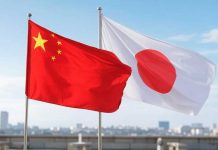BEIJING: The United States should stop politicizing economic and trade issues and evaluate the efforts and achievements from Chinese enterprises in protecting intellectual property in an objective and fair way, Foreign Ministry spokesman Wang Wenbin said on Friday.
He made the remarks after AliExpress and the WeChat e-commerce ecosystem were for the first time identified by the US Trade Representative’s Office as “notorious” markets for counterfeiting and piracy.
The office said in a statement issued on Thursday that China-based online markets Baidu Wangpan, DHGate, Pinduoduo and Taobao continue to be listed, as well as nine physical markets located within China.
“I want to stress that China highly values the protection of intellectual property and our achievements in this aspect are there for all to see,” Wang told reporters at a regular news briefing in Beijing.
According to the spokesman, last year the number of patents granted to applicants from foreign countries reached 110,000 — a year-on-year increase of 23 percent — and more than 194,000 trademarks were registered by foreign applicants, an increase of 5.2 percent from the previous year.
As for American applicants, the number of invention patents granted increased by 32.1 percent while that of registered trademarks increased by 17.3 percent, he added.
“The growth shows foreign enterprises are confident in China’s intellectual property protection and the business environment here,” Wang said.
The spokesman said China also supports Chinese enterprises to conduct cooperation overseas in line with market principles, local laws and regulations.
“We urge the US side to create an open, fair, just and non-discriminatory business environment for the two countries’ enterprises to carry out equal and mutually beneficial cooperation based on mutual respect, in order to jointly push forward the sound and stable development of China-US economic ties,” Wang said.
According to media reports, Alibaba said in a statement it looked forward to continuing to work with governments to address concerns about intellectual property protection across its platforms. A press officer for Tencent, which owns WeChat, said in a statement the company strongly disagreed with the decision and it monitored and deterred intellectual property violations. -The Daily Mail-China Daily News Exchange Item





